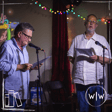Become a Creator today!Start creating today - Share your story with the world!
Start for free
00:00:00
00:00:01

246 Becky Thomas | Literary Agent and Founder of Lewinsohn Literary Agency
Literary agent, Becky Thomas is here, talking about how she became a literary agent, her experiences in the industry and founding her own agency. We also get into lots of advice for querying agents and some of the early impacts of AI on publishing.
Support the show on Patreon! 💖 And get extended episodes, ad-free and a week ahead of everyone else. 🙏
For audio listeners:
Listen to The Chosen Ones and Other Tropes, Jamie's other podcast with Melissa Welliver and Naomi Gibson! 📚
Follow on socials! 🥳
Transcript
Introduction to Writing and Publishing
00:00:00
Speaker
Oh, a spicy question. love it. Because the writing is sort of everything, right? Like you can fix plot holes, but if the writer... So some readers love that and some readers are like, but I wanted more of this. So it's kind of, it's kind of a gamble.
Meet Becky Thomas: Award-Winning Literary Agent
00:00:14
Speaker
Hello and welcome back to the Right and Wrong podcast. On today's episode, I am joined by the British Book Awards Agent of the Year 2022 and the founder of the Lewinson Literary Agency, Becky Thomas. Hello.
00:00:29
Speaker
Hi. Thank you so much for for coming on and and then chatting with me. um I thought it'd be cool if we started at the beginning, your entry point into
Becky's Unexpected Journey into Publishing
00:00:41
Speaker
publishing. Am I right in thinking that your first job in the industry was at Faber & Faber?
00:00:46
Speaker
Yeah, that's right. and It was quite an unusual entry, slightly accidental. I was just with a sort of South East London recruitment agency when I graduated and i was working in travel insurance um and I didn't like that job at all.
00:01:08
Speaker
and wasn't using my English degree in any way. um And then i asked my recruitment agency to find me something else. And they just happened to find me a part time temping job at Faber.
00:01:19
Speaker
So once I was in there, i just thought this is the job for me and just kind of stuck with it and as long as they would let me. Yeah. it wasn't, it wasn't a path that you'd set for yourself that you were like, I want to get into publishing. It was sort of serendipitous that you just were pointed in that direction.
00:01:35
Speaker
Yeah, absolutely. Like I, I'd done a degree in English literature. um and I think in my head I was going to go and be a journalist or something. Um, but, um, and I'd, I'd applied to work at bookshops, um, in my teens, uh,
00:01:51
Speaker
But other than that, no, I didn't really understand or have much knowledge of what the publishing industry was. And these are the days where it was very kind of ah rudimentary kind of Google search engine. So before I went for my first day, I just kind of searched who Faber was online and was like, oh, yeah, I recognize some of these these authors. I've worked on their books at uni. So that was that was it. Looking back now, it was very naive.
00:02:19
Speaker
Um, but I, um, and I, I think it's harder and harder for people to kind of enter that way now.
Transition from Faber to Agenting
00:02:25
Speaker
um but yeah, it was, um, it was just, um, yeah, very serendipitous.
00:02:32
Speaker
Yeah. And you were there for a few years, presumably sort of getting an understanding of publishing and the industry as a whole before Murritan thingy, you then became contract director at Abner Stein.
00:02:47
Speaker
Yeah, well, the job I had at Faber is one that only really exists at Faber, I think, which is um kind of copyright manager looking after a lot of the estates and the poets who didn't traditionally have agents. So i was working kind of licensing their works, doing author care for people like Seamus Heaney, who never had an agent.
00:03:09
Speaker
And so it was almost like this kind of internal agent role at Faber. So it was very unusual, but basically it kind of gave me a grounding for kind of negotiation and author care.
Role and Experience as a Contracts Director
00:03:22
Speaker
So sort of pivoting into agenting made the most sense for me when i was when it was time to move on.
00:03:28
Speaker
Right. Okay. And yeah, then I then i got offered a job as contracts director, maternity cover at Abnerstein. And then I was like, this is my this is my way to sort test whether the agent side of the fence is for me.
00:03:42
Speaker
Okay. What is a contracts director? What what is that role? and That role is essentially negotiating all the contracts on behalf of the agency.
00:03:55
Speaker
Not every agency has a contracts person. It depends kind of on the volume of contracts that they they get, but the agents will negotiate, you know, the headline terms of the deal and then the contracts person would then um sort of negotiate with the contracts team, a publisher, every kind of finer point of the contract.
00:04:15
Speaker
And you're also doing things like getting authors cleared for their tax exemption status and things like that. And one of one of the authors I actually had to clear their tax exemption status for while was there was the newly elected President Obama.
00:04:30
Speaker
So that was what I wanted to do. Wow, that's cool. Okay, so contract director is kind of, a the the agents are taking the point on the initial negotiation and then their contracts director comes in to kind of dot the T's, so the dot the I's and cross the T's.
00:04:48
Speaker
Yeah, but right ah you get kind of very much in the weeds on stuff on some of those ones, depending on who you're dealing with.
Building a Literary Agent Career at WME
00:04:56
Speaker
Okay, okay that's interesting. Um, yeah and then that presumably set you in, it sounds like everything was just building towards you learning all of the skills required to become a literary agent.
00:05:09
Speaker
Uh, and it was, you only started building your, did you start building your list when you moved to WME? Yes, I did. So i i I kind of almost took a sort of retrograde step and became an assistant to an agent because that was kind of the only new way you can kind of start building your list and and start from, you know, in at the ground level. The thing about being an agent is there's only really agent or assistant.
00:05:36
Speaker
um as a role there isn't really a kind of bigger path than that so and yeah that was that was how I kind of started out and working with my agents clients and then building my list on the side as well Okay. And it's my understanding that when it with like literary agencies, if you're applying for a role, if you're if you're going to become an agency assistant, there is a sort of, um it's not necessarily written, but it's a sort of understanding that you will at some point start building a list of your own. Is is that kind of generally accepted?
00:06:09
Speaker
Yeah, I think so. i think probably maybe um it it is dependent on the different agencies and how much that agent needs more of an administrative support role. sure and At the time, WME
Festival Experiences and Talent Discovery
00:06:23
Speaker
was William Morris, and they had a real kind of path for their assistants to become agents.
00:06:29
Speaker
So that was kind of part of the appeal of going there. Okay. Okay. Yeah. And it's, noticed at this point in your publishing journey, you, it says on the, on the website that you were booking festival lineups for literary tents.
00:06:47
Speaker
Yeah. What was, what was that for? Was that a different thing entirely or was that associated to the other work you were doing? No, that was something that me and the agent um that I worked with um were, it was like the kind of very early days of festivals having literary tents, kind of music festivals expanding their literary tents. okay And I think also the thing about WME is it has a big um music department and booking department. So i think and basically it was Rob DeBank who ran Bestival and Camp Bestival
00:07:21
Speaker
sort of approached us and said, I don't know where to start with the kind of literary world. Who should I be having on in the literary tent? And we kind of took it over from there. Oh, okay. That's actually so something that I've been totally has gone over my head.
00:07:35
Speaker
So what, what, what is, what, what happens at the literary tent at a music festival?
00:07:41
Speaker
Essentially, mean, it was it was basically we'd reach out to authors or authors that we already represented and ah kind of curate um three days of readings and conversations. um And yeah, that was kind of how it started, really.
00:08:01
Speaker
It was very organic and we were given like a lot of trust by the festival to just choose, you know, which people we wanted to so have on and then, yeah, offer them some camping and some guest list. And that was it really.
00:08:15
Speaker
and But yeah, it was a very, you know, now I think all those places have proper people hired to do that kind of stuff. But it was the very kind of early days of
Founding Lewinson Literary Agency
00:08:24
Speaker
it. But it as it kind of introduced me to a lot of talent at the same time, it was a kind of real golden era of,
00:08:30
Speaker
and performance poetry and slam poetry um ah who kind of bridged that gap between music and literature so it kind of it kind of introduced us to a lot of of those people and and places like BookSlam would get involved with us as well Okay. Oh, that's awesome. Yeah. that's've I've not been to a music festival for such a long time.
00:08:52
Speaker
I was not aware that this was a thing there, but that sounds awesome. um So like we're we're almost up to the to where you are now. yeah After WME, you went to Fox Mason, which a couple of years later was acquired by... was was that you was that move you going from assistant to full literary agent?
00:09:13
Speaker
Yeah. That was, yeah. That was me kind of um really being as independent as possible. I worked with a guy called Ben Mason who ran Fox Mason. And yeah, that was me really kind of establishing my list and being a full-time agent.
00:09:29
Speaker
And then Fox Mason couple of years later was acquired by Johnson and Alcock. And then long story short, in 2021, you founded your own agency, Lewinson Literary.
00:09:44
Speaker
um Yeah. Was that something you'd been thinking about for a long time? Or was it just like everything aligned and you were like, oh, I should make my own agency? Everything aligned, really. It was it was mostly the pandemic that was the um change, which I think probably happened to a lot of people and where I was slightly basically self-sufficient and and working from home.
00:10:09
Speaker
um And my authors were having a real moment of getting great attention um and lots of success. And it just felt like the right time to be like, here's our identity as a list rather than as a sort of side to another bigger agency.
00:10:25
Speaker
um And yeah, I just realized i could I could do it by myself. So it gave me the confidence. I guess making your own agency, obviously you're the boss now, the freedom to kind of operate however you want to create your own structures and your own rules and things like that.
00:10:42
Speaker
um I do have a question though, because yeah this is it's not unusual for agents to be moving from different agencies. um So I've always wondered in terms of contracts and your list,
00:10:58
Speaker
What are the logistics for for like moving an aid agency? How does that affect your authors and any deals that they might have in place? Um, again, it's really dependent. And this is kind of getting into the weeds a bit. But wasn't, um I was an associate of Johnson & Alcock, which meant I was technically self employed.
00:11:19
Speaker
And so i got to take my list and my contracts with me. Now, I think if you're employed by an agency, you have to leave the contracts behind. But you can take the authors for their new deals.
00:11:31
Speaker
Oh, I see. Okay. Yeah. And have you, from when you first started building your list, as have you have you kept your authors all the way through through the different agencies to now obviously your own agency?
00:11:46
Speaker
There's always some change. So I would say probably the majority is still with me. But I think there's always there's always kind of comings and goings. And I think if I had all of the same people from the beginning, I wouldn't be able to take on any more people. because Yeah, you just you end up kind of.
00:12:04
Speaker
feeling a bit overwhelmed by the amount. So yeah, I think there's just natural times where it it's time to part ways and you've done everything you can for an author. Sure. Yeah. I would say, yeah a lot of my authors I've worked with for about 15 years in total now.
00:12:19
Speaker
Oh, okay. Wow. That's amazing. Yeah. It's just always one of those things I wonder where it's like, what are the rules of in terms of moving between agencies? Because it seems to me that almost always the agent moves and almost all of the authors in their list go with them.
00:12:33
Speaker
Yeah, I mean, it was it is generally that way. You might not be able to take the contracts with you, right and but you would be able to take the authors if they're willing.
00:12:43
Speaker
And some of you know some authors just don't like change. So some of them are like, oh, no, actually, I'm
Genres and Submission Policies
00:12:48
Speaker
fine here. um But in the main, your relationship with your authors is the relationship.
00:12:55
Speaker
And yeah, and I obviously spoke to all my authors before making the decision to check that they were comfortable with it. Okay. Yeah, yeah, yeah. um but let's Let's talk about your authors. Let's talk about your list. um In a sort of broad sense, what sort of genres and ages do you represent?
00:13:17
Speaker
Oh, well, I think one of the things that's brilliant about being an agent and one of the things I think is... sort of brilliant about my agency is that I i can do a bit of everything.
00:13:28
Speaker
um I tend to be driven by the voice and my my books are nearly always quite contemporary. i don't do a lot of what we call genre, which is kind of stuck in sort of like, you know, historical or sci-fi fantasy, just because it's not my area of expertise. And those those are very specific kind of authors. But if my if my authors want to move into those fields, then I'll completely support them in doing that.
00:13:54
Speaker
um But essentially i would say it's the whole gamut from from literary to commercial. um it you know i do cook books, I do illustrated books, I do and young adult. um But I would say in the main, it's kind of like on the nonfiction side, it's kind of memoir and pop culture.
00:14:19
Speaker
And on the fiction side, it's kind of literary and and commercial fiction. But the commercial fiction has always got a bit of a an edge and it's very smartly written. so um I think commercial fiction gets seen as being sort of dumbed down and it it definitely is. And it's one of the hardest genres to write into.
00:14:38
Speaker
Yeah, I think it doesn't help that you like when we call one genre literary, it makes it feel very like smart and sophisticated. And then you but you put it as like yeah almost the opposite of commercial. It's it's kind of an unfair comparison.
00:14:53
Speaker
Yeah. And I would say quite a lot of the stuff I do sort of really brilliantly bridges that gap between the two. Okay. Yeah, yeah, yeah. Those are the books that tend to really like become very, very popular is when it's you can bridge the gap between being very commercial, but also being like very smartly written and and um making a making a point, having a message in there.
00:15:15
Speaker
Yeah, absolutely. Would it be perhaps easier then to identify what you don't represent? So we ticked off genre stuff, so fantasy, sci-fi, historical, don't represent that.
00:15:26
Speaker
I'm guessing you don't represent middle grade or younger. um Again, if if somebody, um one of my authors wants to move into writing middle grade, then I'd be absolutely um up for doing that. And I have had some authors who have written middle grade, even picture books.
00:15:45
Speaker
um So it is possible. It's just a kind of whole new set of kind of connections and marketplace that you're dealing with. you wouldn't you probably wouldn't be that inclined to take a query which was focused on middle grade or like picture books or something?
00:16:01
Speaker
Probably not, no. But yeah, if somebody is kind of already on my list and they want to try that or their approach to do that, which is probably more likely, then we would definitely explore that.
00:16:14
Speaker
Okay. Okay. Right. yay Yeah. um And you are currently open to submissions? I'm not, it's um it's it's purely a capacity thing because it's having time to read the slush pile as well. But what tends to happen is People find their way to me. and So a lot of the authors I've taken on in recent years have been recommended by people, either people within the industry or other authors of mine.
00:16:45
Speaker
So i find that like there's sort of like a natural filter where authors and who I'm meant to be working with find me. um So yeah, i'm I'm not currently open, but I think stuff does reach me if it's meant to reach me.
00:17:01
Speaker
Okay, right. Do you have any plans to open, ah open yourself up to queries again at some point? Or are you kind of um happy with where you're at for now? I think I just have to keep reviewing it because the worst thing would be to sort of being being a kind of one woman agency, I need to be able to really focus on my existing authors and give them the majority of my time. So I think Yeah, if there are periods where I feel like I'm able to, then yes. Or if you know I expand and bring in more staff, then yes.
00:17:36
Speaker
and But at the moment, it's just kind of been really realistic about capacity. I had it open for the first year and and it just was, you know that there wasn't that much that came through from the submission path. So it just didn't seem like and the amount of work that it took wasn't justifying the reward of finding people.
00:17:57
Speaker
who Yeah, that makes sense. I've spoken to more and more agents recently who are sort of moving into sort of on off periods with the submissions being open or closed like every other month, or like they're open for six months and they're closed for six months. Yeah, just because I think Yeah, like you say, it's, it's not necessarily always time efficient, especially if your list is already pretty substantial.
00:18:22
Speaker
Yeah, absolutely. and but we do review it So it is, you know, it is something that we do review definitely. Yeah.
Becky's Desert Island Book Choice
00:18:32
Speaker
Okay. Okay. So something to keep an eye on then, I guess. um Yeah.
00:18:38
Speaker
I do want to talk a little bit about queries and submissions in the event that you open it at some point. And it's always just interesting to hear how agents approach that. But we'll talk about that a bit later on. anyone who ah Anyone who is thinking about submitting, maybe hold off then, I guess. There is a submission page on your website, but if if you're closed...
00:18:57
Speaker
as of september 25 probably hold off and uh yeah where would you if people wanted to like keep an eye on things and just see if you were going to open up would it be would instagram be the best place to kind of yeah stay on top of right instagram would be the best place to check Okay, okay, great.
00:19:15
Speaker
um We are at the point in the episode where we where we set sail and and I ask you, Becky, if you were stranded on a desert island with a single book, which book do you hope that it would be?
00:19:29
Speaker
So I've decided to go for Fever Pitch by Nick Hornby. Okay, what's the what's the story here? what what Why is that the book that grabs you?
Book Interests and Cultural Blends
00:19:39
Speaker
Well, firstly, in a really basic way, I'm a massive Arsenal fan. and When I first read that, I was like, Oh my God, somebody's written the perfect book for me.
00:19:50
Speaker
i I checked, it came out in 1992. So it would have been only about, I'm going give my age away here, 10 years old. And I think it was the point where I moved from reading kind of Point Horror and Sweet Valley High to sort of adult books.
00:20:07
Speaker
Um, and I was just completely, um, obsessed with it. I got it on tape out the library as well, so I could play it in the car on car trips.
00:20:17
Speaker
and Um, it was also Nick Conby was the first, also I ever went and see, do a talk as well when about a boy came out. so just kind of looking back, I'm sort of identifying that as being quite a pivotal book. I remember making my English teacher read it.
00:20:33
Speaker
um And I think for me, first of all, I'd be able to kind of relive Arsenal's glory when I'm stuck on an island and I'm not able to go to the games. and But also I think it's like the perfect um blend of kind of, um it's just got everything that book, I think, in terms of humour and poignancy and thinking about human relationships. And also you've got the kind of,
00:21:05
Speaker
ah culture element that I always like in my books. I love football, i love music i love and film and I love to see those elements in the books that work on.
Conclusion and Social Media
00:21:16
Speaker
Okay, cool. That's fun. Yeah, I think that that's a I think it's ah no one said that before. So it's always fun to have something you thrown into the the desert out island. That's great. I love that. um So as I mentioned, um next up, I do want to chat a little bit about queries and cover letters, even though you're closed. I think it's a really interesting thing for people to hear about how agents do tackle these kinds of things.
00:21:39
Speaker
um We're gonna get into that um as well as maybe a bit about the industry and trends. That's all gonna be in the extended episode available on patreon.com forward slash right and wrong.
00:21:50
Speaker
um Oh, well, hopefully not the book. Yeah. I think the pitch fine. Sure. Yeah, exactly. But yeah, hopefully not the writing book. um But on that note, we've reached the the end of the episode. um So thank you so much, Becky, for coming on and and telling me all about your kind of journey through publishing and and your your career as ah as a literary agent. It's been really cool chatting with you and learning all about the Lewinson Literary Agency.
00:22:17
Speaker
Yeah, you too. Thank you for all the questions. Very thought provoking. And for anyone listening, if you want to keep up with what Becky and the agency are doing, you can follow on Instagram at Lewinson Literary, or you can head over to the website www.lewinsonliterary.com.
00:22:33
Speaker
As I mentioned, it's as of September 2025, Becky is closed to submissions, but if you follow on Instagram, The moment she's open, um I would imagine there'll be posts, there'll be stories to say, you can query now.
Support and Community Engagement
00:22:47
Speaker
To support this podcast, like, follow, subscribe, join the Patreon for ad-free extended episodes and check out my other podcast, The Chosen Ones and other tropes. Thanks again, Becky. And thanks to everyone listening. We will catch you on the next episode.
00:23:01
Speaker
Shout out time. One of my amazing patrons, Lee Foxton, is querying their debut novel. It's a family drama, commercial fiction, along the lines of Jojo Moyes and David Nichols.
00:23:12
Speaker
Fingers crossed. I am rooting for you. Good luck.



















